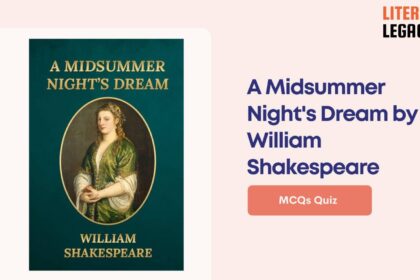1. What is the reason behind Sir William planning to send Septimus to a mental institution?
A. A lack of proportion
B. A lack of memories
C. A lack of feeling
D. A lack of communication
Answer: A lack of proportion (A)
Sir William diagnoses Septimus with ‘a lack of proportion’ and plans to send him to a mental institution.
2. Who despises each other passionately, believing the other to be an oppressive force over Elizabeth?
A. Richard Dalloway and Hugh Whitbread
B. Elizabeth’s history teacher and Miss Kilman
C. Sir William and Dr. Holmes
D. Clarissa and Sally Seton
Answer: Elizabeth’s history teacher and Miss Kilman (B)
The two older women, Elizabeth’s history teacher and Miss Kilman, despise each other.
3. What was Septimus afraid Dr. Holmes would do to him?
A. Destroy his soul
B. Send him to war again
C. Expose his secrets
D. Separate him from Lucrezia
Answer: Destroy his soul (A)
Septimus feared that Dr. Holmes would destroy his soul.
4. What does Clarissa feel responsible for after Septimus’s death?
A. His mental problems
B. His decision to jump from the window
C. His life choices
D. His inability to express love
Answer: His life choices (C)
Clarissa feels responsible for Septimus’s death, as she identifies with him and admires his choices.
5. What does Richard intend to tell Clarissa with the large bunch of roses he brings home?
A. He does not love her anymore
B. He loves her
C. He is leaving her
D. He is going away for a long time
Answer: He loves her (B)
Richard intends to tell Clarissa that he loves her, but he finds himself unable to say it.
6. What does Clarissa believe is vital to the success of her relationship with Richard?
A. Open communication
B. Honesty about her past
C. Expressing affection regularly
D. Complete privacy
Answer: Complete privacy (D)
Clarissa values the privacy she can maintain in her marriage, considering it vital to the success of the relationship.
7. What makes Clarissa feel dissatisfied by her own role during the party?
A. ‘Her inability to express love’
B. Richard’s absence
C. ‘Sally Seton’s presence’
D. The attention from Peter
Answer: ‘Sally Seton’s presence’ (C)
‘Sally Seton’s presence’ makes Clarissa feel dissatisfied by her own role during the party.
8. ‘Septimus and Lucrezia are in their apartment, enjoying a moment of happiness’ implies a sense of:
A. ‘Longing’
B. ‘Anger’
C. ‘Sadness’
D. ‘Joy’
Answer: ‘Joy’ (D)
‘Septimus and Lucrezia are in their apartment, enjoying a moment of happiness’ implies a sense of ‘joy’.
9. ‘Clarissa considers the void that exists between people’, highlighting her contemplation on:
A. ‘Loneliness’
B. ‘Misunderstandings’
C. ‘Emotional distance’
D. ‘Lack of communication’
Answer: ‘Emotional distance’ (C)
‘Clarissa considers the void that exists between people’, reflecting her contemplation on ’emotional distance’.
10. ‘Richard returns home to Clarissa with a large bunch of roses, intending to tell her that he loves her but finds that he cannot’ suggests a theme of:
A. ‘Communication barriers’
B. ‘Marital bliss’
C. ‘Forgiveness’
D. ‘Regret’
Answer: ‘Communication barriers’ (A)
The situation where Richard intends to express love but cannot suggests a theme of ‘Communication barriers’.
11. Who is the main character in ‘Mrs. Dalloway’?
A. Peter Walsh
B. Septimus
C. Richard
D. Clarissa Dalloway
Answer: Clarissa Dalloway (D)
Clarissa Dalloway is the main character, an upper-class housewife.
12. What event is Clarissa preparing for during the day described in the text?
A. A wedding
B. A funeral
C. A business meeting
D. A party
Answer: A party (D)
Clarissa Dalloway is preparing for a party that she will host in the evening.
13. What is Peter Walsh’s relationship to Clarissa?
A. Old suitor and friend
B. Father
C. Brother
D. Cousin
Answer: Old suitor and friend (A)
Peter Walsh is an old suitor and friend of Clarissa Dalloway.
14. How does Peter feel about Clarissa’s refusal of his marriage proposal?
A. He never proposed to Clarissa.
B. He quickly moved on and forgot about it.
C. He still obsesses over it.
D. He returned to propose again.
Answer: He still obsesses over it. (C)
Peter has never quite gotten over Clarissa’s refusal of his marriage proposal.
15. What medical condition does Septimus suffer from?
A. Shell shock
B. Influenza
C. Migraine
D. Broken leg
Answer: Shell shock (A)
Septimus is a veteran of World War I and suffers from shell shock.
16. Where do Septimus and his wife spend time in the text?
A. At a restaurant
B. In their London home
C. At a museum
D. In Regents Park
Answer: In Regents Park (D)
Septimus and his wife, Lucrezia, pass time in Regents Park.
17. Why did Septimus enlist in the war?
A. By accident
B. Romantic patriotic reasons
C. For money
D. Family tradition
Answer: Romantic patriotic reasons (B)
Septimus enlisted in the war immediately for romantic patriotic reasons.
18. What profession does Sir William Bradshaw have?
A. Celebrated poet
B. Psychiatrist
C. Chef
D. Veterinarian
Answer: Psychiatrist (B)
Sir William Bradshaw is a psychiatrist.
19. What effect did World War I have on the English citizens’ perception of the British Empire?
A. It increased their support for the traditional social order.
B. It made them more willing to adhere to the strict class system.
C. It solidified their belief in the empire’s invincibility.
D. It caused them to lose faith in the empire’s power.
Answer: It caused them to lose faith in the empire’s power. (D)
The devastation suffered by England during World War I led to English citizens losing faith in the empire’s power.
20. Which character in ‘Mrs. Dalloway’ represents an individual who still strongly supports English tradition?
A. Clarissa
B. Aunt Helena
C. Richard
D. Peter
Answer: Aunt Helena (B)
Aunt Helena is portrayed in the text as someone who champions English tradition, despite the empire’s disintegration.
21. What aspect of everyday life in Mrs. Dalloway is constantly influenced by thoughts of death?
A. All mundane events
B. Interactions with strangers
C. Buying flowers
D. Attending parties
Answer: All mundane events (A)
In Mrs. Dalloway, thoughts of death permeate all mundane events and interactions, affecting characters like Clarissa and Septimus.
22. How does Peter Walsh react to the idea of death in ‘Mrs. Dalloway’?
A. He accepts it as a natural part of life.
B. He embraces it as a comforting thought.
C. He seeks out ways to challenge its inevitability.
D. He becomes frantic and tries to distract himself from it.
Answer: He becomes frantic and tries to distract himself from it. (D)
Peter Walsh becomes frantic at the idea of death and follows an anonymous young woman through London to try to forget about it.
23. Who in ‘Mrs. Dalloway’ faces death directly and ultimately chooses it over living another day?
A. Septimus
B. Clarissa
C. Peter
D. Richard
Answer: Septimus (A)
Septimus faces death most directly in Mrs. Dalloway, fearing it but ultimately choosing it over what he perceives as a worse alternative.
24. Which character in ‘Mrs. Dalloway’ chooses death as an escape from oppressive social pressures to conform?
A. Septimus
B. Clarissa
C. Miss Kilman
D. Peter
Answer: Septimus (A)
Septimus chooses death in Mrs. Dalloway as a means to escape what he sees as oppressive social pressure to conform.
25. What do Miss Kilman and Sir William Bradshaw share in common in ‘Mrs. Dalloway’?
A. They both encourage open-mindedness.
B. They both support individual freedom.
C. They both seek power through dominance.
D. They both challenge traditional values.
Answer: They both seek power through dominance. (C)
Both Miss Kilman and Sir William Bradshaw wish to convert others to their belief systems in order to gain power and dominate.
26. What are Miss Kilman’s intentions towards Clarissa based on her oppressive nature in ‘Mrs. Dalloway’?
A. She dreams of converting Clarissa due to her religious beliefs.
B. She wants to befriend Clarissa.
C. She intends to learn from Clarissa’s strong will.
D. She plans to support Clarissa’s independence.
Answer: She dreams of converting Clarissa due to her religious beliefs. (A)
Miss Kilman dreams of converting Clarissa in the name of religion, illustrating her oppressive nature.
27. How does Sir William Bradshaw aim to assert his dominance over others in ‘Mrs. Dalloway’?
A. By imposing his worldview to subdue challengers.
B. By promoting free will and individuality.
C. By fostering a collaborative and inclusive environment.
D. By encouraging open dialogue and understanding.
Answer: By imposing his worldview to subdue challengers. (A)
Sir William Bradshaw aims to dominate by subduing those who challenge his worldview or conception of the world in the text.
28. What character in ‘Mrs. Dalloway’ represents an oppressive force that seeks control over others’ beliefs?
A. Septimus
B. Aunt Helena
C. Richard
D. Sir William Bradshaw
Answer: Sir William Bradshaw (D)
Sir William Bradshaw in Mrs. Dalloway represents an oppressive individual who wishes to convert others to his belief system for dominance.
29. What does Clarissa attempt to achieve by throwing parties?
A. To compete with other socialites in hosting lavish events
B. To showcase her wealth and social status
C. To escape from her own inner reflections
D. To facilitate communication and bring people together
Answer: To facilitate communication and bring people together (D)
Clarissa throws parties in an attempt to draw people together and facilitate communication, as stated in the text.
30. How does Peter describe the contradictory human impulses toward privacy and communication?
A. As a constant struggle between the desire for solitude and the need for social interaction
B. He believes that humans can never truly achieve a balance between privacy and communication
C. He compares the soul to a fish that swims in murky water and occasionally surfaces to frolic on the waves
D. He suggests that communication should be prioritized over privacy in a post-war society
Answer: He compares the soul to a fish that swims in murky water and occasionally surfaces to frolic on the waves (C)
Peter tries to explain the contradictory human impulses toward privacy and communication by comparing the soul to a fish that swims along in murky water, then rises quickly to the surface to frolic on the waves.
31. What makes meaningful connections difficult in the post-war world?
A. The increasing emphasis on individualism and privacy over community
B. The physical and emotional scars left by the war
C. The breakdown of communication within families and social circles
D. The lack of understanding between those who support traditional English society and those who hope for continued change
Answer: The lack of understanding between those who support traditional English society and those who hope for continued change (D)
The text states that the war has changed people’s ideas of what English society should be, and understanding is difficult between those who support traditional English society and those who hope for continued change.
32. How does Clarissa view Septimus’s death?
A. As a selfish act that caused unnecessary pain to his loved ones
B. As a result of his mental illness and the failure of medical treatment
C. As a desperate, but legitimate, act of communication
D. As a cowardly escape from the challenges of post-war life
Answer: As a desperate, but legitimate, act of communication (C)
Clarissa sees Septimus’s death as a desperate, but legitimate, act of communication, according to the text.
33. What does Clarissa’s contemplation of the old woman across the street represent?
A. The tension between self-expression and solitude
B. Her desire for a more independent and solitary life
C. Her fear of growing old and losing her social connections
D. Her envy of the old woman’s simpler way of life
Answer: The tension between self-expression and solitude (A)
Clarissa’s thoughts about the old woman in the house across from hers represent the tension between self-expression and solitude, as stated in the text.
34. What does the text suggest about the impact of the war on English society?
A. It changed people’s ideas of what English society should be
B. It reinforced traditional values and brought people closer together
C. It had little impact on society, as people quickly returned to their pre-war lives
D. It led to a breakdown of social norms and increased individualism
Answer: It changed people’s ideas of what English society should be (A)
The text states that the war has changed people’s ideas of what English society should be.
35. How does Clarissa view the old woman’s independence?
A. She celebrates it, but also recognizes the inevitable loneliness that comes with it
B. She sees it as a selfish choice that goes against traditional values
C. She envies it and wishes she could live a similarly solitary life
D. She pities the old woman for her lack of social connections
Answer: She celebrates it, but also recognizes the inevitable loneliness that comes with it (A)
The text states that even as Clarissa celebrates the old woman’s independence, she knows it comes with an inevitable loneliness.
36. What does the text suggest about the characters’ efforts to create meaningful connections?
A. They are not easy to make, no matter what efforts the characters put forth
B. They are futile, as the post-war world has made true understanding impossible
C. They are ultimately successful in overcoming the barriers to communication
D. They are misguided, as true connections can only be found within oneself
Answer: They are not easy to make, no matter what efforts the characters put forth (A)
The text states that meaningful connections in this disjointed post-war world are not easy to make, no matter what efforts the characters put forth.
37. What does Clarissa feel is the ultimate human mystery?
A. The true nature of human emotions and relationships
B. The purpose of life and the inevitability of death
C. How she can exist in one room while the old woman across the street exists in another
D. The origins of the universe and the existence of a higher power
Answer: How she can exist in one room while the old woman across the street exists in another (C)
The text states that Clarissa thinks the ultimate human mystery is how she can exist in one room while the old woman in the house across from hers exists in another.
38. What does the text suggest is the reason for Clarissa’s dissatisfaction with her role during the party?
A. She doubts her ability to host a successful event
B. She struggles to connect with her guests on a deeper level
C. She is preoccupied with her own inner reflections and sense of isolation
D. She feels overwhelmed by the social expectations and obligations
Answer: She is preoccupied with her own inner reflections and sense of isolation (C)
The text suggests that Clarissa feels shrouded within her own reflective soul, implying that her dissatisfaction during the party stems from her preoccupation with her own inner thoughts and sense of isolation.



